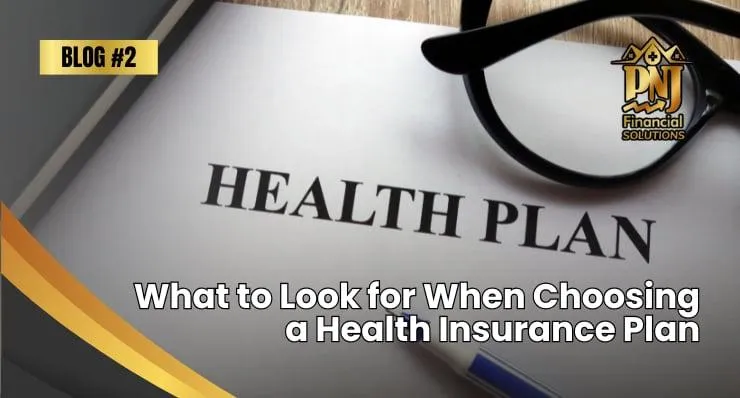
What to Look for When Choosing a Health Insurance Plan

Your guide to making smart, informed choices for your health and wallet
“The greatest wealth is health.” – Virgil
Choosing a health insurance plan can feel like learning a new language. Between all the acronyms—HMO, PPO, EPO—and confusing cost structures, it’s easy to feel overwhelmed. But selecting the right coverage is not just about checking a box; it’s about protecting your future, your finances, and your peace of mind.
Whether you're exploring individual health insurance, navigating employer-sponsored plans, or browsing government marketplace options, this guide will help you decode the jargon and make the best decision for you and your family.

1. Understand the Types of Health Insurance Plans
Before you start comparing prices or benefits, you need to know what you're looking at. Here are the most common types of plans:
HMO (Health Maintenance Organization): Lower premiums, but you must stay in-network and get referrals to see specialists.
Best for: People who don’t mind coordinating care through a primary doctor.PPO (Preferred Provider Organization): More flexible—you can see out-of-network providers without referrals.
Best for: Those who want freedom and are okay with paying more for it.EPO (Exclusive Provider Organization): No referrals needed, but only in-network care is covered.
Best for: Individuals who are okay with fewer choices in exchange for lower costs.POS (Point of Service): A mix of HMO and PPO features. You get referrals and in-network savings, but can go out-of-network at a higher cost.
Best for: Those who want options but also want to keep costs manageable.
✅ Quick Tip: If you frequently travel or have doctors you prefer, a PPO might be worth the extra cost.
2. Don’t Just Look at the Monthly Premium
Yes, it’s tempting to pick the plan with the lowest monthly price. But lower premiums often mean higher deductibles and out-of-pocket costs when you actually need care.
Let’s break it down:
Monthly Premium = What you pay every month
Deductible = What you pay before insurance kicks in
Co-pay/Co-insurance = What you pay for services (like visits or prescriptions)
Out-of-pocket Max = The most you'll ever pay in a year (after that, insurance pays 100%)
💡 Example: A plan with a $200/month premium and a $7,000 deductible may cost more in the long run than a $350/month premium with only a $1,000 deductible—especially if you need ongoing care.

3. Check the Provider Network
Imagine choosing a plan, only to find out your favorite doctor isn’t covered—or worse, your nearest hospital is considered "out-of-network." That can mean surprise bills or full out-of-pocket costs.
✅ Pro Tip: Call your provider or use the insurer’s online directory to confirm who's in-network.
“Out-of-network” care can cost 2 to 4 times more than in-network services. Don’t skip this step.
4. Review Prescription Drug Coverage
If you regularly take medication, the formulary (covered drug list) is crucial. Medications are often grouped into tiers, such as:
Tier 1: Generic drugs (lowest cost)
Tier 2: Preferred brand-name drugs
Tier 3+: Specialty medications (highest cost)
🧠 Tip: If your drug isn’t listed or is in a high-cost tier, you could be paying hundreds per month out of pocket.
5. Consider Added Benefits That Save You Money
Some health insurance plans come with bonus perks that make a big difference over time:
Telehealth visits (especially useful post-pandemic)
Mental health support and therapy sessions
Maternity and newborn care
Dental and vision (included or as add-ons)
Gym memberships and wellness incentives
🏋️ Real Talk: If you're paying out-of-pocket for therapy, dental cleanings, or eye exams, a plan with these benefits can actually save you thousands per year.
6. Look at the Insurance Company’s Reputation
Not all insurance companies are created equal. Before you commit:
Read real customer reviews online
Check ratings from J.D. Power, NCQA, or Better Business Bureau
Look into how easy it is to file claims, get help, or speak to a live agent
📞 In an emergency, you don’t want to be stuck on hold for an hour.

7. Compare Plans Side-by-Side
Use tools like HealthCare.gov, your state marketplace, or private comparison sites to view your options in one place.
Look at:
Monthly premium
Deductibles
Network coverage
Prescription drug list
Extra benefits
🎯 Don’t just pick the cheapest. Pick what fits your lifestyle and medical needs.
Final Thoughts: Choose What Works for You
At the end of the day, the best health insurance plan is the one that gives you peace of mind—knowing you're covered without breaking the bank.
To recap:
Know your plan types
Balance monthly cost with coverage
Confirm your doctors are in-network
Check drug coverage and tiers
Explore additional perks and reputation
Compare, compare, compare
🗣️ “Health isn’t everything, but without it, everything else is nothing.” Make the investment now—your future self will thank you.

